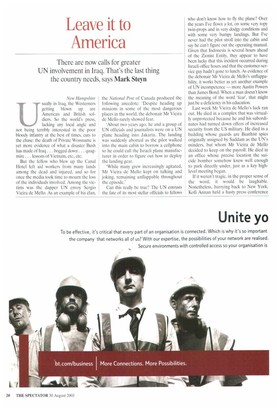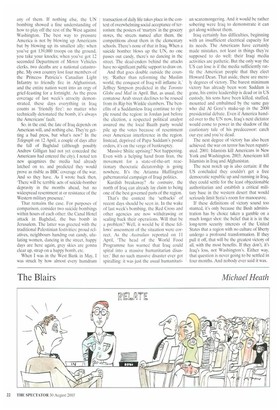Leave it to America
There are now calls for greater
UN involvement in Iraq. That's the last thing the country needs, says Mark Steyn
New Hampshire
Usually in Iraq, the Westerners getting blown up are American and British soldiers. So the world's press, lacking any local angle and not being terribly interested in the poor bloody infantry at the best of times, cuts to the chase: the death of Private Wossname is yet more evidence of what a disaster Bush has made of Iraq. . . bogged down. . . quagmire . . . lessons of Vietnam, etc., etc.
But the fellow who blew up the Canal Hotel left aid workers from many lands among the dead and injured, and so for once the media took time to mourn the loss of the individuals involved. Among the victims was the dapper UN envoy Sergio Vieira de Mello. As an example of his élan, the National Post of Canada produced the following anecdote: 'Despite heading up missions in some of the most dangerous places in the world, the debonair Mr Vieira de Mello rarely showed fear.
'About two years ago, he and a group of UN officials and journalists were on a UN plane heading into Jakarta. The landing was suddenly aborted as the pilot walked into the main cabin to borrow a cellphone so he could call the Israeli plane manufacturer in order to figure out how to deploy the landing gear.
'While many grew increasingly agitated, Mr Vieira de Mello kept on talking and joking, remaining unflappable throughout the episode.'
Can this really be true? The UN entrusts the fate of its most stellar officials to fellows who don't know how to fly the plane? Over the years I've flown a lot, on some very ropy twin-props and in very dodgy conditions and with some very bumpy landings. But I've never had the pilot stroll into the cabin and say he can't figure out the operating manual. Given that Indonesia is several hours ahead of the Zionist Entity, they appear to have been lucky that this incident occurred during Israeli office hours and that the customer-service guy hadn't gone to lunch. As evidence of the debonair Mr Vieira de Mello's unflappability, it works better as yet another example of UN incompetence — more Austin Powers than James Bond. When a man doesn't know the meaning of the word 'fear', that might just be a deficiency in his education.
Last week Mr Vieira de Mello's luck ran out. He died in a complex that was virtually unprotected because he and his subordinates had turned down offers of increased security from the US military. He died in a building whose guards are Baathist spies originally assigned by Saddam as the UN's minders, but whom Mr Vieira de Mello decided to keep on the payroll. He died in an office whose precise location the suicide bomber somehow knew well enough to park directly under, just as a key highlevel meeting began.
If it weren't tragic, in the proper sense of the word, it would be laughable. Nonetheless, hurrying back to New York, Kofi Annan held a hasty press conference at Stockholm airport to make sure everyone knew who to blame. 'We had hoped that by now the coalition forces would have secured the environment for us to be able to carry on the essential work of political and economic reconstruction, institution-building, and for Iraqis to carry on with their work. That has not happened.'
It wasn't the coalition forces who filled your building with Saddamite agents. Mr Secretary-General. That was your choice.
The Canal Hotel turned out to be a perfect microcosm of the UN: a group of naive internationalists refusing to take the murkier characters prowling the corridors at face value and concerned only to keep the US at arm's length. Yet for Kofi Annan, the French, the Democratic party and the world's media, the self-inflicted insanity of what happened to the UN in Baghdad apparently demonstrates the need for Washington to hand over more control of Iraq to the blue helmets because 'they've got far more experience in these kinds of situations'. The UN's track record at nationbuilding varies according to the strength of the local obstructionist. Mr Vieira de Mello did such a good job transforming East Timor from the brutalised province of a Muslim dictatorship to a functioning infidel democracy that whoever makes Osama bin Laden's audio tapes these days added it to his list of grievances against the West. But the dapper diplomat did a less impressive job in Cambodia, where Hun Sen decided to hijack the state, King Sihanouk strung along, and the UN colluded in the subversion of its political settlement.
If Kofi got his hands on Iraq, as world opinion so devoutly wants, the Cambodian scenario would be more relevant than the East Timorese. The most determined obstructionists in this case would be Iraq's Arab neighbours: Egypt, Syria, Saudi Arabia and co. don't care whether the country winds up under another Baathist psychotic or a rent-a-rant mullah. or even a restored Hashemite as long as he's at least minimally repressive. But they object very strongly to the idea of the Iraqi people living in liberty under a representative government with a free press, etc., because that's not the kind of thing they want catching on. Putting the UN in charge of Iraq is a vote for 'stability' in the Middle East — the fetid cesspit stability of the Assads and Ayatollahs that, as argued in this space many times, is the principal 'root cause' of the region's problems.
That's why I'd rather the Americans stayed in control. To be sure, they'd like a bit more help. But they're not going to get it. Quite reasonably enough, the French, Germans and Russians, having declined to help win the war, see no reason why they should help win the peace. As for the 'coalition of the willing', it's not as willing as it could be. Even the doughty British now have barely more than a quarter of the troop strength they had in April. The numbers could be bolstered a bit from countries that, unlike France, are more susceptible to US pressure. But they're the kind of places that haven't much to contribute, and getting a couple of dozen Papuans or Estonians doesn't do anything in practical terms except impose additional operational complexities and expose you to more sneering cracks from leftist snobs about 'nations you can buy on e-Bay'.
Besides, Iraq doesn't need more foreign troops. It needs better intelligence, and the best way to get that is with the locals, not a detachment of Slovenian Hussars. It could also use New Zealand civil servants. Canadian police, Norwegian border guards, all of whom would be more useful than anything their respective militaries could contribute. But it's unlikely to see
any of them. If nothing else, the UN bombing showed a fine understanding of how to play off the rest of the West against Washington. The best way to pressure America is not by blowing up Americans but by blowing up its smallest ally: when you've got 139,000 troops on the ground, you take your knocks; when you've got 12 seconded Department of Motor Vehicles clerks, two deaths are a national catastrophe. My own country lost four members of the Princess Patricia's Canadian Light Infantry to friendly fire in Afghanistan, and the entire nation went into an orgy of grief-feasting for a fortnight. As the press coverage of last week's atrocity demonstrated, these days everything in Iraq counts as 'friendly fire': no matter who technically detonated the bomb, it's always the Americansfault,
So, in the end, the fate of Iraq depends on American will, and nothing else. They're getting a bad press, but what's new? In the Telegraph on 12 April, a couple of days after the fall of Baghdad (although possibly Andrew Gilligan had not yet conceded the Americans had entered the city), I noted ten new quagmires the media had already latched on to, and predicted they would prove as risible as BBC coverage of the war. And so they have. As I wrote back then, 'There will be terrible acts of suicide-bomber depravity in the months ahead, but no widespread resentment at or resistance of the Western military presence.'
That remains the case. For purposes of comparison, consider two suicide bombings within hours of each other: the Canal Hotel attack in Baghdad, the bus bomb in Jerusalem. The latter was greeted with the traditional Palestinian festivities: proud relatives, neighbours handing out candy, ululating women, dancing in the street, happy days are here again, grey skies are gonna clear up, strap on a happy bomb, etc.
When I was in the West Bank in May, I was struck by how almost every humdrum transaction of daily life takes place in the context of overwhelming social acceptance of terrorism: the posters of 'martyrs' in the grocery stores, the streets named after them, the competitions about them in the elementary schools. There's none of that in Iraq. When a suicide bomber blows up the UN, no one passes out candy, there's no dancing in the street. The dead-enders behind the attacks have no significant public support to draw on.
And that goes double outside the country. 'Rather than reforming the Muslim world, the conquest of Iraq will inflame it,' Jeffrey Simpson predicted in the Toronto Globe and Mail in April. But, as usual, the comatose Arab street declines to be roused from its Rip bin Winkle slumbers. The benefits of a Saddamless Iraq continue to ripple round the region: in Jordan just before the election, a respected political analyst assured me the local Baath party would pile up the votes because of resentment over American interference in the region. Instead, deprived of Papa Saddam's postal orders, it's on the verge of bankruptcy.
Massive Shiite uprising? Not happening. Even with a helping hand from Iran, the movement for a state-of-the-art reactionary theocratic dictatorship is going nowhere. It's the Arianna Huffington gubernatorial campaign of Iraqi politics.
Kurdish breakaway? Au contraire, the north of Iraq can already lay claim to being one of the best governed parts of the region.
• That's the context the 'setbacks' of recent days should be seen in. In the wake of last week's bombing, the Red Cross and other agencies are now withdrawing or scaling back their operations. Will that be a problem? Well, it would be if these fellows' assessment of the situation were correct. As the Australian reported on 11 April, The head of the World Food Programme has warned that Iraq could spiral into a massive humanitarian disaster.' But no such massive disaster ever got spiralling: it was just the usual humanitari
an scaremongering. And it would be rather sobering were Iraq to demonstrate it can get along without them.
Iraq certainly has difficulties, beginning with an insufficient electrical capacity for its needs. The Americans have certainly made mistakes, not least in things they're supposed to do well: their Iraqi media activities are pathetic. But the only way the US can lose is if the media sufficiently rattle the American people that they elect Howard Dean. That aside, there are merely degrees of victory. The barest minimum victory has already been won: Saddam is gone, his entire leadership is dead or in US custody, his sons have been killed, stuffed, mounted and embalmed by the same guy who did Al Gore's make-up in the 2000 presidential debate. Even if America handed over to the UN now, Iraq's next dictator would come to power in the shadow of the cautionary tale of his predecessor: catch our eye and you're dead.
The next degree of victory has also been achieved: the war on terror has been repatriated. 2001: Islamists kill Americans in New York and Washington. 2003: Americans kill Islamists in Iraq and Afghanistan.
The next notch up is also certain: if the US concluded they couldn't get a free democratic republic up and running in Iraq, they could settle for the least objectionable authoritarian and establish a critical military base in the western desert that would seriously limit Syria's room for manoeuvre.
If these definitions of victory sound too stunted, it's only because the Bush administration has by choice taken a gamble on a much longer shot: the belief that it is in the long-term security interests of the United States that a region with no culture of liberty undergo a profound transformation. If they pull it off, that will be the greatest victory of all, with the most benefits. If they don't, it's Iraq's loss, not Washington's. Either way, that question is never going to be settled in four months. And nobody ever said it was.




























































 Previous page
Previous page